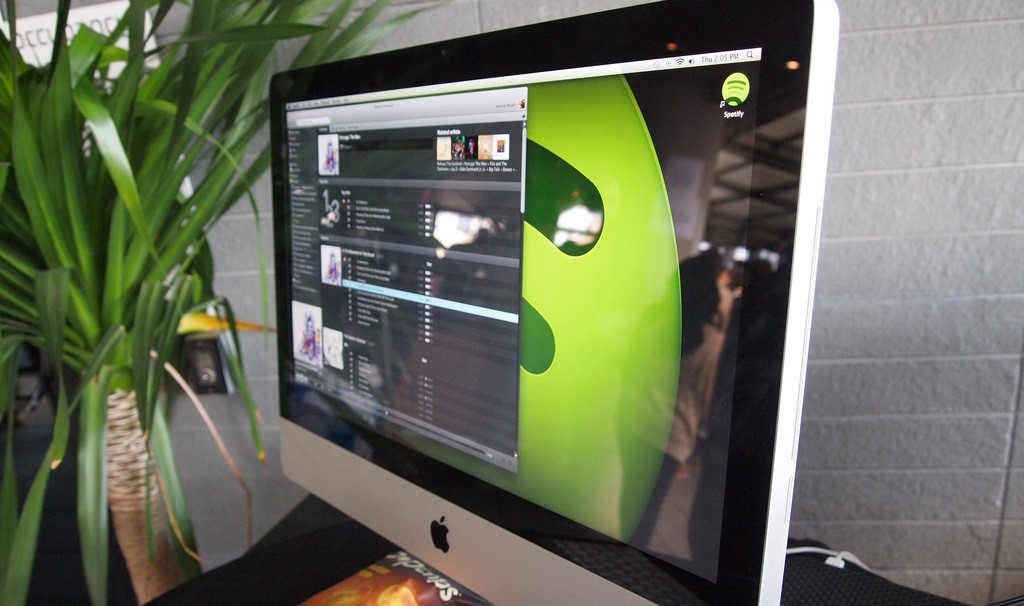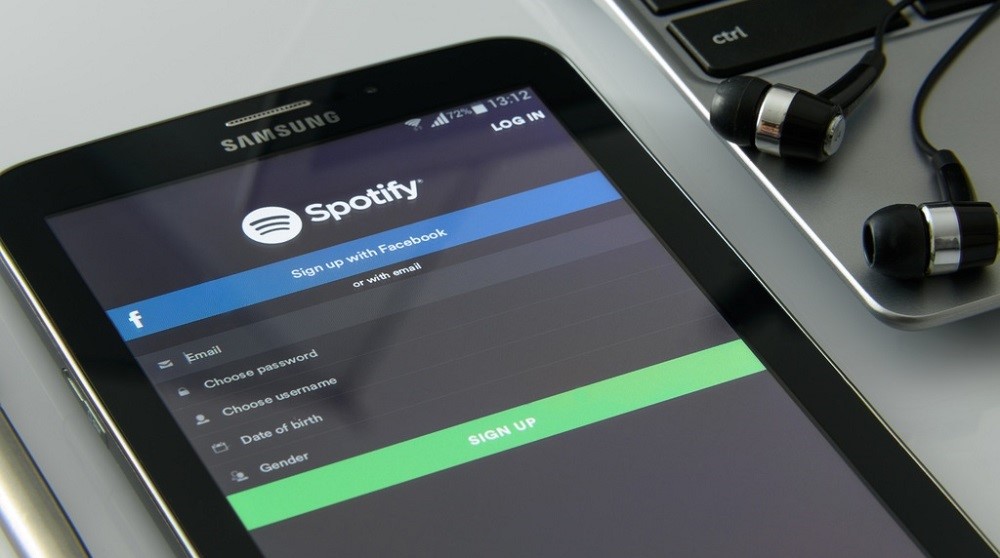Situation: Spotify makes direct deals with musicians - labels are unhappy
In the beginning of summer, the streaming service Spotify announced about its plans to pay musicians directly, "bypassing" labels. This displeased the record companies.
More information about the conflict, its causes and consequences for Spotify - tell under the cut.
 Our microformat - Telemania channel "Audiomania"
Our microformat - Telemania channel "Audiomania"

Photo by Andrew Mager / CC
Spotify offered significant amounts to performers in exchange for direct licensing of their music. The size of fees for such transactions - hundreds of thousands of dollars.
Spotify's revenue in 2017 amounted to four billion euros, but the service still remains unprofitable . Therefore, a new business model is a good opportunity to correct the situation.
Today, half of each dollar earned by the venue goes to the record companies, and another quarter is taken by the performer himself. Working directly with musicians, the company hopes to save on label payments and increase its income.
Statements of the streaming company about direct licensing caused a negative reaction from many independent labels . According to one of the representatives of the indie label, such companies are highly dependent on streaming revenue, but do not have leverage on Spotify.
Spotify has access to data that the labels do not possess, which also gives an advantage to the streaming service. Based on this, the service can make business decisions (to invest in musicians), based not on assumptions, but on specific facts - statistics on listening to certain compositions. Independent labels believe that if they don’t have access to this information anymore, the market situation will only get worse.
Another strength of Spotify is that the streaming platform does not require exclusive rights to the music that it licenses. Artists retain the ability to sell their works on other sites owned by Apple , Google and others.
Working with streaming platforms and receiving payments from listened to songs is one of the main sources of income for indie labels. Therefore, direct deals with Spotify musicians threaten to make the existence of the latter virtually meaningless.
The rights to most of the performers on Spotify belong to Warner, Sony and Universal. Now they receive more than half of the proceeds for each song they listened to (the rights to which they own). In 2017, during negotiations, the streaming service managed to agree on a reduction in payments, but according to some sources, the average percentage dropped from 55% to only 52%. At the same time, the labels made it clear that all the relief measures for the streaming service will end there. They are not satisfied with the policy of “direct deals”, therefore, when renewing contracts next year, there will be no “benefits”.

Photo PxHere / PD
Direct deals - not the first action of the service, which caused discontent labels. Last July, The Vulture suggested that Spotify pays little-known musicians for creating tracks (without vocals), which the site includes in its thematic playlists (jazz, piano, music for relaxation, and so on).
Spotify is needed to expand the library and increase activity on the site. However, a large number of “cheap” tracks are “hammered” by playlists, and other musicians remain out of sight of the listener. The result is a reduction in payments to labels due to fewer auditions. On the other hand, the site itself refuted this state of affairs .
As the music news portal Music Business Worldwide (MBW) notes, major labels are preparing a series of measures for Spotify. And now the big three, having a huge impact on the music industry, prevents Spotify from entering the markets of individual countries.
Earlier this month, it became known that the launch of Spotify in India, which was to be held this summer, was postponed indefinitely. Warner, Sony and Universal refused to license their music to launch a streaming service. All this can create problems when entering the markets of other countries: Russia, South Korea, African states.
The outcome of the story can be expected next year, when the streaming service will re-sign contracts with Warner, Sony and Universal.
Что мы пишем о звуке в Telegram:
 Пятничная музыка для работы
Пятничная музыка для работы
 Как зазвучали Звездные войны
Как зазвучали Звездные войны
 Куда движется музыка в VK?
Куда движется музыка в VK?
More information about the conflict, its causes and consequences for Spotify - tell under the cut.
 Our microformat - Telemania channel "Audiomania"
Our microformat - Telemania channel "Audiomania"
Photo by Andrew Mager / CC
Direct deals
Spotify offered significant amounts to performers in exchange for direct licensing of their music. The size of fees for such transactions - hundreds of thousands of dollars.
Spotify's revenue in 2017 amounted to four billion euros, but the service still remains unprofitable . Therefore, a new business model is a good opportunity to correct the situation.
Today, half of each dollar earned by the venue goes to the record companies, and another quarter is taken by the performer himself. Working directly with musicians, the company hopes to save on label payments and increase its income.
Opinion indie labels
Statements of the streaming company about direct licensing caused a negative reaction from many independent labels . According to one of the representatives of the indie label, such companies are highly dependent on streaming revenue, but do not have leverage on Spotify.
Spotify has access to data that the labels do not possess, which also gives an advantage to the streaming service. Based on this, the service can make business decisions (to invest in musicians), based not on assumptions, but on specific facts - statistics on listening to certain compositions. Independent labels believe that if they don’t have access to this information anymore, the market situation will only get worse.
Another strength of Spotify is that the streaming platform does not require exclusive rights to the music that it licenses. Artists retain the ability to sell their works on other sites owned by Apple , Google and others.
Working with streaming platforms and receiving payments from listened to songs is one of the main sources of income for indie labels. Therefore, direct deals with Spotify musicians threaten to make the existence of the latter virtually meaningless.
Conflict with the big three
The rights to most of the performers on Spotify belong to Warner, Sony and Universal. Now they receive more than half of the proceeds for each song they listened to (the rights to which they own). In 2017, during negotiations, the streaming service managed to agree on a reduction in payments, but according to some sources, the average percentage dropped from 55% to only 52%. At the same time, the labels made it clear that all the relief measures for the streaming service will end there. They are not satisfied with the policy of “direct deals”, therefore, when renewing contracts next year, there will be no “benefits”.

Photo PxHere / PD
Direct deals - not the first action of the service, which caused discontent labels. Last July, The Vulture suggested that Spotify pays little-known musicians for creating tracks (without vocals), which the site includes in its thematic playlists (jazz, piano, music for relaxation, and so on).
Spotify is needed to expand the library and increase activity on the site. However, a large number of “cheap” tracks are “hammered” by playlists, and other musicians remain out of sight of the listener. The result is a reduction in payments to labels due to fewer auditions. On the other hand, the site itself refuted this state of affairs .
Effects
As the music news portal Music Business Worldwide (MBW) notes, major labels are preparing a series of measures for Spotify. And now the big three, having a huge impact on the music industry, prevents Spotify from entering the markets of individual countries.
Earlier this month, it became known that the launch of Spotify in India, which was to be held this summer, was postponed indefinitely. Warner, Sony and Universal refused to license their music to launch a streaming service. All this can create problems when entering the markets of other countries: Russia, South Korea, African states.
Spotify was going to launch a service in the Russian Federation in 2015. But then these plans were suspended for economic reasons. In March of this year, Daniel Ek during the annual conference of the newly declared its readiness to enter the Russian market . But while the streaming service does not agree with the labels, this initiative is under threat.According to a representative of one of the recording studios, they already have several strong partners in all these markets: “The task of Spotify is to convince us to help them. While we are not sure that we should do it. ” It is unclear how the confrontation of Spotify and labels will end.
The outcome of the story can be expected next year, when the streaming service will re-sign contracts with Warner, Sony and Universal.
Что мы пишем о звуке в Telegram:
 Пятничная музыка для работы
Пятничная музыка для работы Как зазвучали Звездные войны
Как зазвучали Звездные войны Куда движется музыка в VK?
Куда движется музыка в VK?